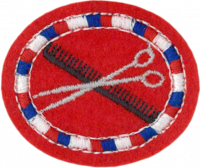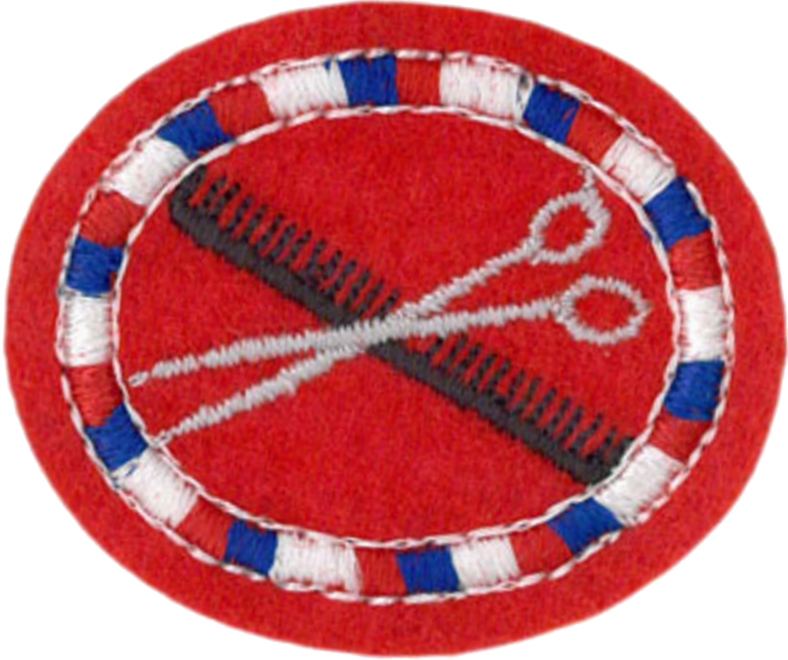Difference between revisions of "AY Honors/Barbering and Hairstyling/Answer Key/es"
(Created page with "Esta especialidad no le convertirá en un peluquero o estilista (que toma semanas o meses de escuela), pero debe aprender acerca de las herramientas del trabajo y obtener un a...") |
(Created page with "</noinclude> <!-- 4. Ser capaz de explicar y demostrar al menos dos métodos para cortar el cabello. -->") |
||
| Line 43: | Line 43: | ||
</div> | </div> | ||
| − | + | {{clear}} | |
| − | |||
| − | |||
| − | + | <noinclude></noinclude> | |
| − | <noinclude | ||
| − | |||
{{CloseReq}} <!-- 3 --> | {{CloseReq}} <!-- 3 --> | ||
{{ansreq|page={{#titleparts:{{PAGENAME}}|2|1}}|num=4}} | {{ansreq|page={{#titleparts:{{PAGENAME}}|2|1}}|num=4}} | ||
| − | <noinclude> | + | <noinclude></noinclude> |
| − | </noinclude> | + | <!-- 4. Ser capaz de explicar y demostrar al menos dos métodos para cortar el cabello. --> |
| − | <!-- 4. | ||
| − | |||
| − | + | No debería ser necesario realmente dar un recorte completo de cabello, aunque puede tener la confianza para dar un recorte simple como un principiante. Traiga sus propios voluntarios o use cabezas de práctica de una escuela de peluquería. | |
| − | |||
| − | |||
| − | + | <noinclude></noinclude> | |
| − | <noinclude | ||
| − | |||
{{CloseReq}} <!-- 4 --> | {{CloseReq}} <!-- 4 --> | ||
{{ansreq|page={{#titleparts:{{PAGENAME}}|2|1}}|num=5}} | {{ansreq|page={{#titleparts:{{PAGENAME}}|2|1}}|num=5}} | ||
| − | <noinclude> | + | <noinclude></noinclude> |
| − | </noinclude> | + | <!-- 5. Explicar y demostrar el propósito de al menos dos diferentes clases de peines utilizados en el corte de cabello. --> |
| − | <!-- 5. | ||
| − | |||
| − | + | Un peine es un dispositivo dentado utilizado para el peinado, la limpieza y el manejo de cabello y cuero cabelludo. Los peines son algunos de las herramientas más antiguas encontradas por los arqueólogos, siendo descubiertos en formas muy refinadas de los asentamientos que datan desde hace 5.000 años en Persia. | |
| − | |||
| − | |||
| − | + | Hay muchas clases de peines para el cabello en el mercado hoy en día. | |
| − | |||
| − | |||
<div lang="en" dir="ltr" class="mw-content-ltr"> | <div lang="en" dir="ltr" class="mw-content-ltr"> | ||
| Line 90: | Line 74: | ||
</div> | </div> | ||
| − | + | <noinclude></noinclude> | |
| − | <noinclude | ||
| − | |||
{{CloseReq}} <!-- 5 --> | {{CloseReq}} <!-- 5 --> | ||
{{ansreq|page={{#titleparts:{{PAGENAME}}|2|1}}|num=6}} | {{ansreq|page={{#titleparts:{{PAGENAME}}|2|1}}|num=6}} | ||
| − | <noinclude> | + | <noinclude></noinclude> |
| − | </noinclude> | + | <!-- 6. Explicar y demostrar el propósito de dos diferentes clases de tijeras. --> |
| − | <!-- 6. | ||
| − | |||
| − | + | {{clear}} | |
| − | |||
| − | |||
| − | + | {{clear}} | |
| − | |||
| − | |||
| − | + | {{clear}} | |
| − | |||
| − | |||
| − | + | <noinclude></noinclude> | |
| − | <noinclude | ||
| − | |||
{{CloseReq}} <!-- 6 --> | {{CloseReq}} <!-- 6 --> | ||
{{ansreq|page={{#titleparts:{{PAGENAME}}|2|1}}|num=7}} | {{ansreq|page={{#titleparts:{{PAGENAME}}|2|1}}|num=7}} | ||
| − | <noinclude> | + | <noinclude></noinclude> |
| − | </noinclude> | + | <!-- 7. Explicar y demostrar al menos dos razones para el uso de una máquina para cortar el cabello. --> |
| − | <!-- 7. | ||
| − | |||
| − | + | {{clear}} | |
| − | |||
| − | |||
| − | + | <noinclude></noinclude> | |
| − | <noinclude | ||
| − | |||
{{CloseReq}} <!-- 7 --> | {{CloseReq}} <!-- 7 --> | ||
{{ansreq|page={{#titleparts:{{PAGENAME}}|2|1}}|num=8}} | {{ansreq|page={{#titleparts:{{PAGENAME}}|2|1}}|num=8}} | ||
| − | <noinclude> | + | <noinclude></noinclude> |
| − | </noinclude> | + | <!-- 8. Escribir 500 palabras sobre lo que aprendió durante su aprendizaje. --> |
| − | <!-- 8. | ||
| − | |||
| − | + | Este breve informe debe cubrir el conocimiento requerido para esta especialidad y otras cosas que haya aprendido. ¿Qué se siente trabajar en el cuidado del cabello? ¿Qué aprendió de la persona con la que siguió? | |
| − | |||
| − | |||
| − | + | <noinclude></noinclude> | |
| − | <noinclude | ||
| − | |||
{{CloseReq}} <!-- 8 --> | {{CloseReq}} <!-- 8 --> | ||
<noinclude><div lang="en" dir="ltr" class="mw-content-ltr"> | <noinclude><div lang="en" dir="ltr" class="mw-content-ltr"> | ||
Revision as of 23:42, 18 May 2021
1
Comience por pedir permiso para seguir a un peluquero o estilista por el día o un par de horas durante varios días.
Durante este ejercicio, debe ser capaz de aprender las respuestas a los demás requisitos y demostrar las habilidades requeridas. La mayoría de los peluqueros y estilistas les gusta hablar y estarán dispuestos a explicar lo que hacen y cómo lo hacen.
Esta especialidad no le convertirá en un peluquero o estilista (que toma semanas o meses de escuela), pero debe aprender acerca de las herramientas del trabajo y obtener un aprecio para esta ocupación técnica que ayuda a todos a quedarse bien peinado.
2
- . Washing
- . Combing or Brushing
- . Regular cut or trim
3
Probablemente quisiera traer un amigo/víctima para este ejercicio. Tal vez otro Conquistador desarrollando la especialidad para que puedan dar champú el uno al otro. El peluquero puede juzgar la exactitud del trabajo de champú.
- Soak the hair, first. It's important that the hair is wet to make shampooing easy otherwise it won't work. Use warm or cold water.
- Massage the scalp. Petrissage is a scalp massaging technique to stimulate blood-flow to the scalp encouraging healthy hair and scalp, it also removes dirt.
- Shampoo your hair. Hair usually only needs one or two applications of shampoo. More than this can lead to static or fly-away results and leave the hair unprotected. If the first shampoo application doesn't lather, rinse, then shampoo a second time.
- Rinse your hair. It's important to ensure that no shampoo residue remains as this can dry the scalp out and create a flaky itchy scalp, it also leaves a greasy film
- Add conditioner. Gently squeeze the water out of your hair. Distribute the conditioner evenly through the hair using only your fingers. Never use a comb in the shower. It will pull on your hair and create more breakages in the long run.
- Rinse, Again. Rinse the hair thoroughly ensuring no residue is left behind. To finish use cold water which will close the cuticles, resulting in shine and give your hair bounce.
- Thoroughly dry your hair. When towel-drying never rub the hair as this will cause tangling and damage the cuticle of the hair. Air drying is better because blow dryers dry out your hair.
- Style the hair with gel or proceed to cutting.
4
No debería ser necesario realmente dar un recorte completo de cabello, aunque puede tener la confianza para dar un recorte simple como un principiante. Traiga sus propios voluntarios o use cabezas de práctica de una escuela de peluquería.
5
Un peine es un dispositivo dentado utilizado para el peinado, la limpieza y el manejo de cabello y cuero cabelludo. Los peines son algunos de las herramientas más antiguas encontradas por los arqueólogos, siendo descubiertos en formas muy refinadas de los asentamientos que datan desde hace 5.000 años en Persia.
Hay muchas clases de peines para el cabello en el mercado hoy en día.
- Wide tooth combs are best for getting out tangles.
- Fine tooth combs help get the hairs all in place. You may wish to begin with a wide tooth and then finish up with the fine tooth model.
- Rat Tail Comb - You might think that the rat tail is simply a comb with a handle, but the tail is actually designed to help get parts straight. Use the handle portion of the “rat tail” to run across the area you wish to part.
- A Pin Tail comb allows for precise parting. It is also a good tool for men straightening their hair with a flat iron because it can work with one particular section without leaving stray hairs. It also keeps you from accidentally poking your scalp. The pin tail comb allows for precision work, such as adding a streak of color.
- Barber Combs allow the barber to cut and trim without getting too close to the head, kind of like the guards on an electric clipper. Barber combs are tapered to provide a lot of different options.
- The Rake comb resembles a garden rake. It is very good for untangling long hair.
- Teasing Comb are used to add some texture and body. The teasing comb is used by taking a strand of hairs and holding them straight up. Run the teasing tool from six to ten times through the hairs. Do this with as many strands as you like. You should have a fairly long hairstyle for this to be most effective.
Condensed from this site where you can find comb photos.
6
7
8
Este breve informe debe cubrir el conocimiento requerido para esta especialidad y otras cosas que haya aprendido. ¿Qué se siente trabajar en el cuidado del cabello? ¿Qué aprendió de la persona con la que siguió?
Historical Notes
This is one of the older honors available. It was called antique and then discontinued with the other vocational honors before being returned to active.


